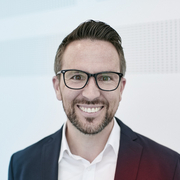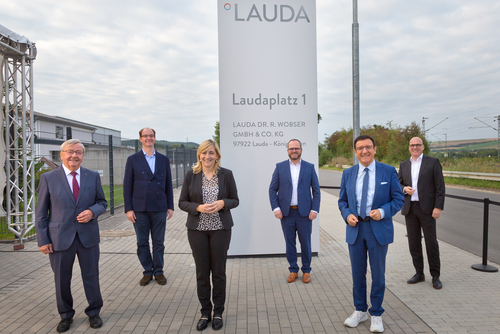
Great pride at the inauguration of Laudaplatz 1: Advisor and Shareholder Dr. Gerhard Wobser, Mayor Dr. Lukas Braun, Bundestag Member Nina Warken, Managing Director of LAUDA, Dr. Gunther Wobser, Landestag Member Prof. Dr. Wolfgang Reinhart, and President & CEO of LAUDA, Dr. Marc Stricker.
Celebratory inauguration of the Laudaplatz at the LAUDA headquarters
LAUDA DR. R. WOBSER GMBH & CO. KG celebrated the inauguration of the new Laudaplatz (Lauda Square) with a celebratory ceremony in front of the gates of its head office in Lauda-Königshofen. The open-air inauguration ceremony was attended by the company management, partners and the management group, along with important political representatives, namely Mayor Dr. Lukas Braun, Member of the Landestag Prof. Dr. Wolfgang Reinhart, and Member of the Bundestag Nina Warken. In total, around 50 guests were present at the ceremony, which was compliant with coronavirus restrictions. From now on, LAUDA can be found at the new address, Laudaplatz 1.
“Our company is 65 years old, and for 65 years, Pfarrstrasse was our home.” With these words, Dr. Gunther Wobser, Managing Director of LAUDA, opened his ceremonial speech for the historic change of company address. Laudaplatz 1 befits both company’s status as a global market leader in temperature control technology and the company’s connection with the region and the town of Lauda-Königshofen. The family company will also remain open to the general public: “We have created a representative, public space that invites cyclists, athletes and passers-by to stay a while.” The new Laudaplatz is a “fine new address for an expanding family company,” declared Dr. Gunther Wobser.
Words of praise from politicians
Prof. Dr. Wolfgang Reinhart, Member of the Landestag (State Parliament) and Vice President of the Baden-Württemberg Landestag, praised the cosmopolitan and locally connected outlook of the company. At the same time, he spoke highly of the extraordinary contribution of medium-sized companies to the German economy. Member of the Bundestag (Federal Parliament) Nina Warken was also present for the inauguration of Laudaplatz 1. “The new address reflects the deep connection between Lauda-Königshofen and LAUDA,” said Nina Warken in her laudatory speech. “As a world market leader, LAUDA has made an important contribution during the pandemic, both in Germany and internationally,” remarked the politician, looking back on the past year. She praised the varied social commitments of the company and highlighted the lifetime achievements of Dr. Gerhard Wobser, the former Managing Director, who also attended the inauguration as a guest. In reference to the new address, Nina Warken ended her admirable speech with “Nomen est nomen”. For the inauguration, the mayor of Lauda-Königshofen, Dr. Lukas Braun, handed over the official street sign with the new address to Dr. Gunther Wobser. The town is proud of LAUDA, said Dr. Lukas Braun: “Many congratulations on this successful christening.”
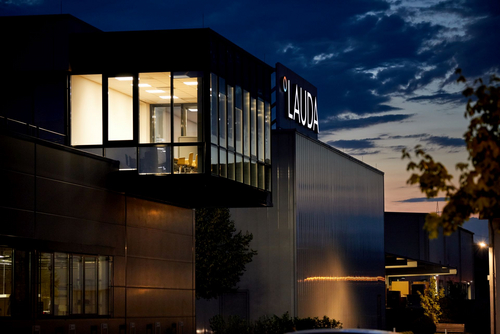
The Hybrid Work Tour will stop at LAUDA on September 23.
Microsoft Hybrid Work Tour as guest at LAUDA
On September 23, the Microsoft Hybrid Work Tour will be presenting at the premises of LAUDA DR. R. WOBSER GMBH & CO. KG will present solutions for digital, location-independent and collaborative work. As part of a camper tour through five German cities, including Munich, Kassel and Berlin, Microsoft experts will be organizing workshops and live webinars on the topic of hybrid working between September 20 and 24.
A visible sign of the tour is that the participants will be traveling in converted motorhomes and vehicles. Among other things, webinars will be offered throughout the day, as well as live broadcasting, posting and tweeting from a vintage bus while at LAUDA. »We are delighted to be hosting the Hybrid Work Tour on September 23 at the LAUDA site in my hometown of Lauda-Königshofen«, explains LAUDA President and CEO Dr. Gunther Wobser. »Even before Corona, working with digital tools shaped our everyday lives, so the knowledge of the experts will certainly be of great interest to our employees«, continues Dr. Gunther Wobser.
On their German tour, Microsoft experts will introduce interested parties, followers and users to hybrid, location-independent, digital working in live webinars and on-site workshops. This will also include the live show »Alex & Ragnar«, which is well-known in the scene and will be broadcast live on YouTube that evening - with Dr. Gunther Wobser as a special guest - starting at 9 pm.
»As long-standing partners of Microsoft, we are pleased that the Hybrid Work Tour is making a stop in Tauberfranken outside of the metropolises«, clarifies Dr. Mario Englert, Managing Director at LAUDA and, among other things, responsible for the information technology of the global market leader. »The increased use of digitalization in the context of communication and also cooperation is a major, lasting effect of the Corona pandemic. LAUDA was and is also very well positioned and prepared in this regard.« Digital working methods and communication channels have now become established in the company, Dr. Mario Englert continued. »On September 23, LAUDA presented itself not only as a host for one of the largest software companies in the world, but also as a power user. Because the digita-len workshops and the uncomplicated exchange with experts benefit all LAUDA employees.«
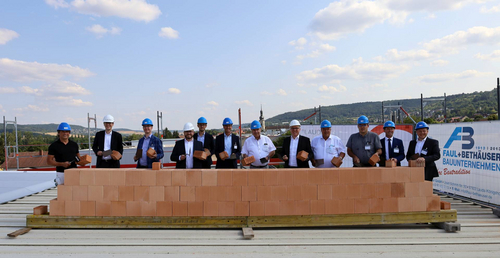
Symbolic laying of the foundation stone of LAUDA DR. R. WOBSER GMBH & CO. KG as the official start of construction for an addition to the existing office building with (from left) architect Klaus Schreiner, LAUDA Managing Director Dr. Mario Englert, Mayor Dr. Lukas Braun, Dr. Gunther Wobser, President and CEO, Christoph Baumann, Head of Production, Peter Vogel, Chairman of the Board of Sparkasse Tauberfanken, Herbert Bethäuser, Faul + Bethäuser, LAUDA Managing Director Dr. Marc Stricker, Norbert Groß, Faul + Bethäuser, Tobias Blessing, Municipality of Lauda-Königshofen as well as Wolfgang Albert and Thomas Englert from Sparkasse Tauberfranken.
LAUDA expands headquarters with office space
With a symbolic laying of the foundation stone, LAUDA DR. R. WOBSER GMBH & CO. KG celebrated the official start of construction for an addition to an existing office building on July 22, 2021. When the office building with production hall was erected and completed in 2008, an extension was already planned, reported Dr. Gunther Wobser, President and CEO of the company, in the presence of guests of honor, cooperation partners, the two other LAUDA Managing Directors Dr. Marc Stricker and Dr. Mario Englert, Production Manager Christoph Baumann, Daniel Eckl, Operations Technology and Services and Sebastian Fell, Marketing LAUDA.
"Especially in these Corona times, the laying of the foundation stone and the start of construction are both a sign of confidence and one for entrepreneurial growth due to an expansive order situation," explained Dr. Gunther Wobser. Therefore, it is very important to create not only additional space for production, but also for office staff. As an ambitious expansion target, the world market leader for temperature control equipment and systems is aiming for a turnover of 250 million euros per year in the next few years. In order to meet the increased space requirements at the company's central headquarters, the existing multi-storey building is being extended by a further floor.
Managing Director Dr. Marc Stricker estimated the building project planned and supervised by architect Klaus Schreiner at around 2,500 m³ of space on a gross area of 430 m². It provides for office space in an "open space concept", including rooms for lounges and technical infrastructures. Completion of the building, with a total investment volume of around 1.1 million euros, and the start of occupancy are scheduled for March 2022, although the start of construction has been delayed somewhat due to the current shortage of building materials. "It was important to us to work with regional partner companies as far as possible," Dr. Marc Stricker emphasized. Accordingly, 50 percent of the contracts have so far been awarded to companies from the region without exception, such as the construction company Faul und Bethäuser GmbH.
"This structural expansion is a further commitment by LAUDA to its main site in Lauda-Königshofen, which is enormously good for the town and its development," emphasized Mayor Dr. Lukas Braun, who was among the small group of guests of honor at the ceremonial laying of the foundation stone at lofty heights, such as architect Klaus Schreiner, the two construction company managing directors Herbert Berthäuser and Norbert Groß, Peter Vogel, Chairman of the Board of the Sparkasse Tauberfanken, and the town's master builder Tobias Blessing. At the same time, he said, it was a renewed sign and mosaic stone for the dynamic entrepreneurship of the Wobser family, which is anchored in the city. "However, it is not just about pure growth, but also about the constant search for new technical innovations and developments," affirmed Dr. Lukas Braun. The mayor went on to attest to the company and its management that they are not "caretakers of the existing", but are constantly thinking ahead in the field of temperature control technology. "I wish the family-owned company LAUDA to continue to advance its culture of innovation so dynamically and successfully," Dr. Lukas Braun summed up.
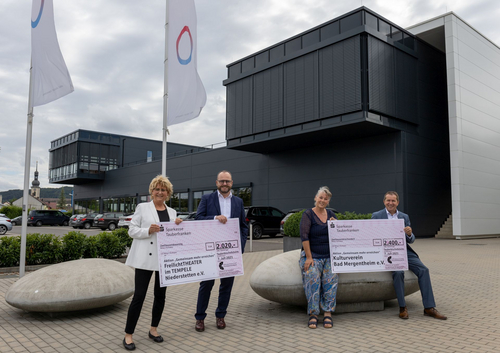
Handing over donations at LAUDA: Heidi Griefenow-Maedel from the FreilichtTHEATER im TEMPELE Niederstetten e.V. 1993 with Dr. Gunther Wobser, President and CEO of LAUDA, Monika Schumann from the Kulturverein Bad Mergentheim e.V. with Paul Gehrig, Commercial Director of Stadtwerk Tauberfranken. (from left to right)
LAUDA supports cultural institutions with donation
LAUDA DR. R. WOBSER GMBH & CO. KG, the world market leader for tempering equipment and systems, is participating in the fundraising campaign of the Tauberfanken Donors' Association. In doing so, the family-owned company is supporting the regional cultural scene, which in many parts has been put under strain due to the pandemic. At the official handover of donations on July 7, 2021, Heidi Griefenow-Maedel from the FreilichtTHEATER im TEMPELE Niederstetten e.V. 1993 and Monika Schumann from the Kulturverein Bad Mergentheim e.V. were guests at LAUDA's company headquarters. Dr. Gunther Wobser, CEO and President of LAUDA, presented the symbolic checks together with Paul Gehrig from the Tauberfranken public utility company and Thomas Landwehr from Sparkasse Tauberfranken.
»Cultural operators are having a particularly hard time in the pandemic« explained Thomas Landwehr, one of the initiators of the action. That is why the Tauberfranken Donors' Association was founded, which supports non-profit cultural associations together with companies from the region. According to Thomas Landwehr, donations have already been handed over three times. He always hears stories that make people sad. For LAUDA, supporting the campaign was a matter of course: »When I was asked by the Sparkasse for support, I immediately agreed wholeheartedly,« explained Dr. Gunther Wobser, President and CEO of LAUDA, at the check presentation. LAUDA has been closely associated with the cultural scene in the region for decades. Among other things, the company hosts the LAUDA FabrikGalerie bi-monthly - with a current break due to the pandemic - which celebrates its 25th anniversary this year.
»Wir sind sehr froh, dass wir jemanden haben, der uns unterstützt«, bedankte sich Heidi Griefenow-Maedel bei den Anwesenden. Auch wenn man nicht wisse, wie sich die Pandemie im nächsten Jahr entwickeln werde, wolle man »nicht den Kopf in den Sand stecken«, so die Vorsitzende des Vereins. »Ohne Sie wäre es wirklich nicht möglich«, bestätigt auch Monika Schumann, Spielleiterin im Kulturverein Bad Mergentheim. Dr. Gunther Wobser zeigte sich beeindruckt von den Schilderungen der Spendenempfänger über die immensen Schwierigkeiten während der derzeitigen Gesundheitskrise. »Vielen Dank für Ihre Einsichten«, schloss der Geschäftsführende Gesellschafter von LAUDA.
»We are very happy to have someone who supports us,« said Heidi Griefenow-Maedel, thanking those present. Even if one does not know how the pandemic will develop next year, one does not want to »bury one's head in the sand,« said the chairwoman of the association. »Without you, it really wouldn't be possible,« Monika Schumann, play director at the Bad Mergentheim cultural association, also confirmed. Dr. Gunther Wobser was impressed by the donation recipients' descriptions of the immense difficulties during the current health crisis. »Thank you very much for your insights,« concluded the President and CEO of LAUDA.
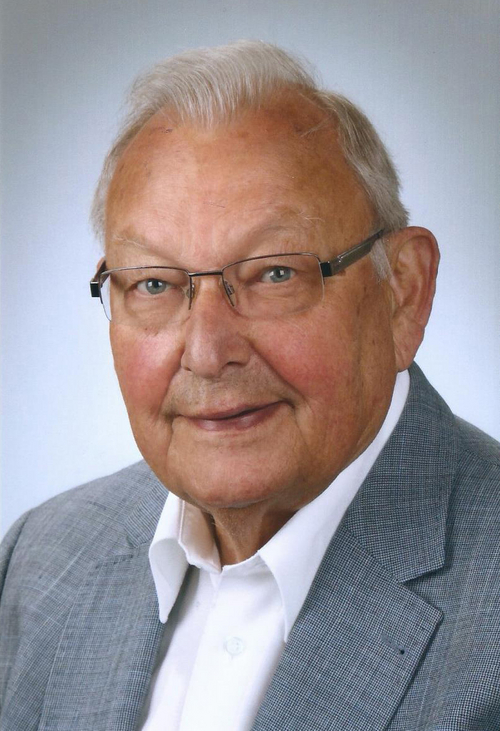
Karlheinz Wobser celebrates his 85th birthday on June 28, 2021.
Former managing director of LAUDA committed to the region
Karlheinz Wobser, who is widely known in the region as a former managing partner of LAUDA for many years and due to numerous honorary activities, will celebrate his 85th birthday today, Monday.
Karlheinz Wobser was born in Dresden on June 28, 1936, the first child of Dr. Rudolf Wobser and Dorothea Wobser, née Nitzki. In 1942, the year of the war, he was enrolled in school in Medingen, about 20 kilometers away, where his father had been given the task of setting up an apparatus department at the Medingen test equipment plant. On his way to school, which was about 1.5 kilometers long, Wobser often had to throw himself into the ditch to avoid low-flying air raids. The night of February 13, 1945, when Dresden sank into rubble, was a traumatic experience. In 1954, he graduated from the Dresden-Süd high school. From the fall of 1954, he studied mechanical engineering, specializing in precision mechanics, at the Technical University of Dresden. During a practical semester, Wobser learned practical skills at the Medingen testing equipment plant, among other places.
In May 1955, the parents decided to leave the GDR after the political pressure on the father became stronger and stronger. The Wobser family fled to West Berlin in August 1955, and a month later they flew to Frankfurt am Main. The family found accommodation for some time in Schwenningen am Neckar. Until March 1956, Karlheinz Wobser worked as a mechanic at the Wigo factory in Schwenningen, while the rest of the family had meanwhile moved to Burlafingen near Neu-Ulm. During this time, his father, who was searching for investors, a location and possible customers for his own company throughout Germany, found interest in the Lauda city council as well as the factory owners Erich Widmann and his friend Paul Hagspiel. On March 1, 1956, Messgeräte-Werk LAUDA DR. R. WOBSER KG was founded, which celebrated its 65th anniversary this year.
After his application for admission to the Federal Republic of Germany failed, Karlheinz Wobser was threatened with deportation back to the GDR. Fortunately, however, he obtained an identity card a few years later and thus Federal German citizenship. The previous uncertainties were, however, a major reason why Wobser did not resume his studies. Nevertheless, he played a decisive role in the establishment of his father's young measuring instrument factory LAUDA. As one of the first employees, he learned the theoretical and technical basics of refrigeration technology. The fact that LAUDA refrigeration circulators gained an excellent reputation worldwide in the following years is the decisive merit of Karlheinz Wobser.
In January 1957, Karlheinz Wobser met his future wife, Gudrun Schüssler from Tauberbischofsheim. Three children, Andrea (1962), Gabriele (1963) and Ulrike (1964), were born. In the meantime, all daughters have their own families with grown-up children. In addition, two of his daughters still work in the company today. Now, with a newly developed and revolutionary program for the young company, a steady upward development began, more and more employees were hired and construction phase followed construction phase. From 1957 to 1977, Wobser was the company's technical director. When the company founder, Dr. Rudolf Wobser, died on June 17, 1977 after a short, serious illness at the age of only 66, his two sons Karlheinz Wobser and Dr. Gerhard Wobser became managing partners of the LAUDA company. Karlheinz Wobser retired at the end of 2002. His nephew Dr. Gunther Wobser was appointed as the new managing partner, and today he is the third generation to lead the family business. Until 2010, he managed the company together with his father Dr. Gerhard Wobser, before the latter also retired after 39 years.
In addition to his career and family, Karlheinz Wobser's life has been marked by numerous honorary commitments. From 1985 to 2008, he was a member of the Board of Directors of Sparkasse Tauberfranken, from 1996 to 2004 he was an honorary commercial judge at the Chamber for Commercial Matters at Mosbach District Court, and for many years he was a member of the Assembly of Representatives of the AOK. In addition, he was a member of several clubs in Lauda and was a board member of both the Lauda Tennis Club and the Bauland Air Sports Club for many years. For several years he was a member of the golf club Glashofen-Neusaß near Walldürn. In addition to golfing, other hobbies of the jubilarian included traveling on river cruises, making music on the accordion and keyboard, maintaining his koi fish pond, boating on the lakes of Mecklenburg, especially with his four grandchildren, and painting, which he is now less and less able to do for health reasons.
Wobser followed the reconstruction of the Frauenkirche in his native city of Dresden with great interest and donated substantial contributions to the Friends, of which he is still a member. As a result, Wobser was also a guest at the inauguration ceremony of the Frauenkirche in Dresden in October 2005. "Despite all the adversities, I can describe my childhood in Medingen as a happy time, even if memories naturally transfigure some things," says Wobser, who for many years maintained contact not only with his old home, but also with his old school friends. "Live and let live," is what Wobser calls an essential motto that has accompanied him throughout his 85 years of life and has always been very important to him.
